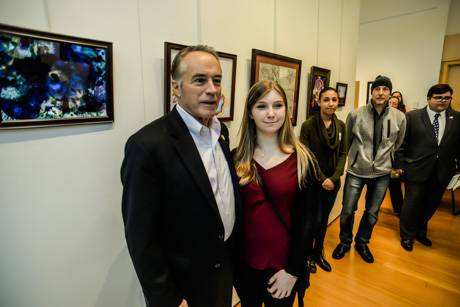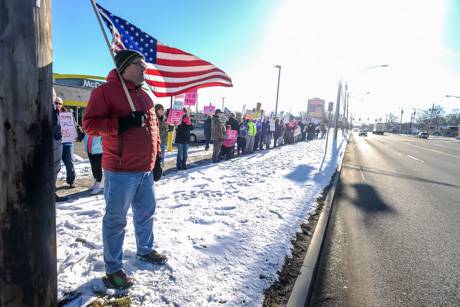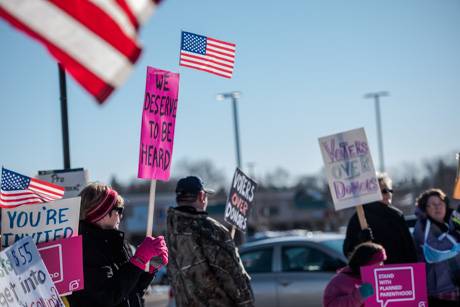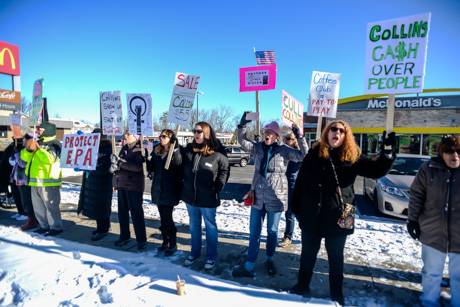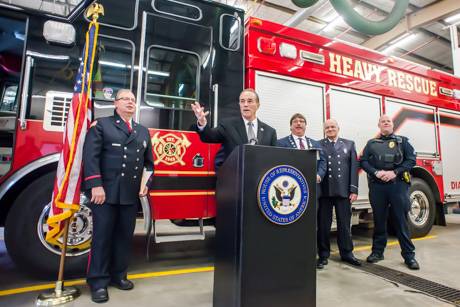It might be nice to think that some bit of magic could just make the county share of Medicaid expense disappear, but somebody has to pay one way or another, said Lt. Gov. Kathy Hochul during an interview with The Batavian yesterday about the Collins' Amendment to the GOP's health care coverage reform bill.
"It’s not a free gift," Hochul said. "You can’t say, 'oh, this is going to be great,' and have it work out. They have not thought through the ramifications for this."
Rep. Chris Collins convinced the House GOP leadership to allow his amendment to the American Health Care Act, ostensibly a replacement for the Affordable Health Care Act, pushed through Congress by the Obama Administration in 2010. The amendment affects only New York and blocks the state from taking county money to provide Medicaid coverage to residents.
County leaders have long complained that this unfunded mandate is crippling local budgets and forcing counties to cut other services.
"Year after year, Albany’s leadership relies on counties to foot the bill for New York State’s out-of-control Medicaid costs. Enough is enough," Collins said in a statement released when he announced the amendment. "This amendment will stop Albany from forcing its unfunded mandate down the throats of taxpayers, and help counties lower the property tax burden on hardworking families."
The cost shift won't lead to cuts in property taxes, Hochul predicted, but there would be other ramifications for New York's taxpayers. Those ramifications could include either the poor and middle-class families who rely on Medicaid having $2.3 billion in services cut or counties losing their share of sales tax collections.
"Here's what is going happen, and the counties need to be aware of this, there are going to be tough choices to compensate for the Collins' scam and one of them is to re-examine the assistance we give to counties now," Hochul said.
According to Hochul, when Medicaid was created, the condition set up by the state was that counties would pay for 25 percent of Medicaid coverage and to compensate counties for the cost, counties could keep a portion of sales tax revenue.
County Manager Jay Gsell isn't sure that is exactly the history of sales tax in New York and said he's researching it. The threat to take money away from the counties if the amendment goes through is in line with Gsell's prediction in a story we published yesterday about the amendment.
"The state is not going to go quietly into the night," Gsell said.
We had trouble getting in touch with Hochul or staff members before yesterday's story, so yesterday Hochul had her staff reach out to The Batavian to arrange an interview so she could address local residents directly about her concerns with the Collins' amendment.
"I want people to have a full perspective that if you take out the county’s share, there are still going to be consequences," Hochul said. "Either we cut services $2.3 billion or we raise taxes, and it just comes from another pocket in the State of New York to the tune of $2.3 billion."
Hochul has long positioned herself as an advocate for local communities, and she said she is, but it's also her job as lieutenant governor now to look out for all the people of New York and the Collins Amendment, she said, will be devastating for the state.
"The governor and I are very much aware of this cost on counties and that’s why the governor cut that share down to 13 percent and so now NY state counties are paying less per person than they did back in the year 2000," Hochul said. "In addition, we did two more things: we capped the escalation of these costs, so the state is picking up any increases in the Medicaid costs. That has been in place the last five years and the governor also in 2011 created the Medicaid redesign team to squeeze out saving out of this program; $34 billion has been saved overall, and a large part of that was savings for the counties."
There is some dispute over the history of how we got in a position where county taxpayers are helping to foot the bill for a program that is billed as a "state and federal" benefit for people who can't otherwise afford healthcare. New York is one of only 16 states that pass some of the cost onto county taxpayers and New York's county share is the highest in the nation.
"What they’re proposing is the unraveling of a deal that was put in place in the 1960s when, at the time, counties were picking up 44 percent of their residents' health care costs," Hochul said. "Then when Medicaid and Medicare were in enacted in 1965 there was the thought we could reduce that down for the counties to 25 percent and also allow them -- again, allow them -- to collect some sales tax to offset that cost."
Gsell's version includes 1960 with the Kerr-Mills Act, which created a program called Medical Assistance for the Aged. It gave states the ability to create a medical coverage program and decide on the criteria for eligibility. The Federal government provided matching funds to cover the costs. The act was a precursor to Medicaid.
The prior 1950s program, Gsell said, provided matching funds for state payment to medical providers on behalf of people on public assistance.
"Nowhere did I find that NYS counties were voluntary partners in these pre-Medicaid funding programs," Gsell said. "The Hochul quote about counties paying pre-Medicaid, pre-1965, 44 percent of elderly indigent care, which NYS reduced our 'burden' to 25 percent, maybe 'accurate' in regards to then cost sharing, but this 1965 to 2017 Medicaid program is not the same in terms of benefits, entitlement, number of recipients, with counties having no say in size, eligibility and an open-ended entitlement as back 52-plus years ago."
The Cuomo Administration has been in full attack mode the past few days over the Collins Amendment. Yesterday, The Batavian received at least a half-dozen press releases from the governor's office about the amendment, plus statements funneled through the governor's press release database from hospitals in the region attacking the amendment.
"The radical conservative ideology in Washington has declared war on New York with legislation that will devastate hospitals across the state and hurt New Yorkers," Cuomo is quoted as saying in one press release. "These massive cuts will cripple our hospitals and ravage the health care services on which New Yorkers rely."
The other bit of history that came out in news reports yesterday over the Medicaid spat is that Andrew Cuomo's father, Mario, when he was governor pushed for years for the state to pick up the county's share of the Medicaid tab.
Both Andrew Cuomo and Hochul have accused Collins of political pandering to try and secure more Upstate congressional votes for the AHCA, which is far from guaranteed passage. The reform, pushed as part of President Donald Trump's promise to repeal and replace Obamacare, would scuttle direct subsidies to people who purchase insurance through health care exchanges, as well as end the individual mandate to buy health insurance, and replace it with a refundable tax credit for all qualifying Americans.
Critics contend the bill would drive up the cost of health insurance while conservatives argue the bill doesn't actually repeal Obamacare.
A poll commissioned by The Economist shows strong opposition to the AHCA in several rural Upstate districts, including the NY-24 (33 percent support / 51 percent oppose), NY-23 (38/45), NY-22 (38/45), NY-21 (37/45), as examples.
In the NY-19, the district of John Faso, the cosponsor of the Collins' Amendment, 35 percent support and 48 percent oppose. The bill has a little stronger support in Collins' own district, the NY-27, with a split of 40/42.
"The reason that Representative Collins proposed this is to literally offer a bribe to on-the-fence Upstate Republicans who were starting to hear from constituents that decimating and destroying the Affordable Care Act, which benefits seven million New Yorkers now, is not something their constituents really want," Hochul said.
Cuomo has characterized the Collins Amendment as putting politics before people, and we asked Hochul about that statement, noting that really any decision about budgets, taxes, and spending is about people. For Genesee County, a cost savings of $9.4 million might not lead to much, or any, savings to taxpayers, but it could save critical programs.
This past year, the County Legislature went through a contentious budget debate that had some members of the Legislature even floating the idea of eliminating deputies from road patrols. The county will also likely be forced by the state to build a new jail in a few years, plus the county needs at least $15 million in road and bridge repairs.
Meanwhile, New York's menu of Medicaid options is the most generous in the nation and the program leaves the perception of operating on an open checkbook. (Gsell provided this chart that shows county share of Medicaid expense across the nation and New York's is far and away the highest rate.)
"I disagree with your assessment that it’s an open checkbook," Hochul said. "The fact (is) that we shaved $34 billion off of it just in the last few years and the governor continues to have a Medicaid redesign team in place to make sure we’re cutting costs."
Hochul said if the ACA is repealed, it's just going to drive up costs for all New York taxpayers because the uninsured will be more likely to use emergency rooms for routine medical needs.
"They’re going to the ER and the cost is going to be dramatically higher," Hochul said. "Those costs are being picked up by taxpayers. People have to realize this is a united system and we’re going to continue as a state to cut those costs."
She said New York's costs are higher because we have a larger elderly, middle- and working-class population and our industrial past means we have higher rates of cancer. She recalled seeing as a child the pollution spewed by steel plants, for example, in Buffalo area.
"That is largely a way to explain why we have higher costs, not that we’re just throwing good money after bad," Hochul said. "We have a governor who is very tight-fisted with the state’s taxpayers' dollars. He’s very conscientious. That’s why we’ve cut middle-class taxes. We’ve cut business taxes. We continue to focus on creating jobs to put more money back into the local economy, more sales tax for the counties, more property tax revenue for house sales. It all works together. You can’t just pull out one piece of the puzzle and have that collapse and have the other part be picked up by everybody else."
She called the Collins' amendment a betrayal of the people of New York.
"The number one rule for doctors is 'first do no harm,' " Hochul said. "I think that should also apply to members of Congress. What Chris Collins is proposing will inflict harm and pain on the people of the State of New York and we have to get pressure on him to take this back and put it on the sidelines and realize this is a horrible mistake."
Late yesterday, Collins, who won the NY-27 seat from Hochul three years ago, put out a press release that characterized the Cuomo Administration's response to his proposed amendment as "a complete meltdown."
“Governor Cuomo and his sidekick are using doomsday predictions to scare everyday New Yorkers into allowing Albany to continue taxing them to death," Collins said. "It’s absolutely disgusting the governor would threaten the middle class with a tax increase while holding a $14 billion taxpayer-funded slush fund in his back pocket. As I have said before, if this Governor can’t find 1.5 percent to save in his budget, I am more than willing to find it for him.”

